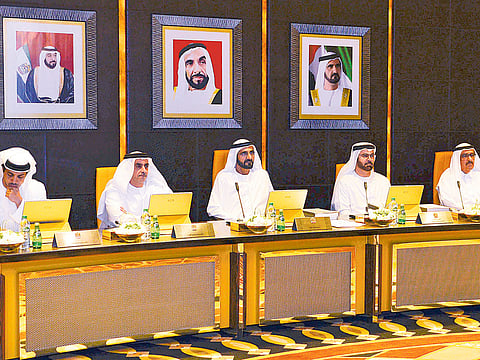UAE Cabinet approves national charter for happiness
Mohammad Bin Rashid approves several initiatives to ensure happiness in society

Abu Dhabi: The Cabinet approved the national happiness and positivity charter, which stipulates the UAE’s commitment to establishing an environment that ensures the happiness and well-being of society.
A package of initiatives to create a happy and productive work environment at federal government bodies was also approved during today’s meeting chaired by His Highness Shaikh Mohammad Bin Rashid Al Maktoum, Vice-President and Prime Minister of the UAE and Ruler of Dubai.
“Happiness and positivity are a lifestyle and government’s commitment and a true spirit that unites the Emirati community,” Shaikh Mohammad said.
The move coincides with the International Day of Happiness, which is celebrated through the world on March 20 every year. The day was founded on June 28, 2012, by the United Nations General Assembly.
The national programme features policies, initiatives and services to create the world’s happiest government work environment, as well as initiatives tailored specifically to motivate and urge the private sector to establish a happy work environment for its employees.
“We are at the beginning of a new phase during which we learn something new every day to achieve the good, well-being and happiness of our people, wishing happiness for all peoples of the world,” the Vice-President said.
The newly approved programme will serve as a national charter that provides for the Cabinet’s commitment through its higher policies, plans, projects and services at all government agencies to establish positivity as a key value to ensure the happiness and well-being of individuals, families and society.
The Cabinet also approved a range of initiatives and projects, submitted by Ohoud Khalfan Al Roumi, Minister of State for Happiness, as part of the national happiness programme.
The programme includes appointment of a CEO for happiness and positivity at all government bodies, and the establishment of councils for happiness and positivity at federal entities.
Certain hours will be allocated for happiness-related programmes and activities at the federal government and establishing offices for happiness and positivity as well.
Customer service centres will be transformed into customer happiness centres. Special programmes are tailored to change government employees’ culture from serving customers to making them happy.
The programme also includes annual indexes, surveys and reports to measure happiness in all community segments. The National Programme for happiness and positivity was approved by Shaikh Mohammad earlier this month. The programme features a host of initiatives in three major areas, the first of which is the inclusion of happiness in the policies, programmes and services of all government bodies as well as the work environment.
The second area will be consolidating the values of positivity and happiness as a lifestyle in the UAE community and, finally, developing tools and indexes to gauge happiness levels.
The national happiness and positivity charter aims to establish the concept of happiness and positivity from the Emirati government’s perspective under which the UAE is committed to achieving happiness and positivity in society. All government bodies will have to work according to the charter in order to achieve this in a perfect manner.
Five Initiatives
There are five main initiatives to ensure a happy work environment. They include the adoption of a standard form for corporate happiness and positivity at all government bodies in the country. Others include the culture of corporate happiness, characteristics of happy employee, indices to gauge corporate happiness and positivity.
The councils of happiness and positivity will include representatives of various sectors and areas. It aims to ensure that all plans and services follow a unified approach to realise happiness and positivity.
CEOs of happiness and positivity will be appointed by the competent minister or the board chairman with a view to enhance the culture of happiness and positivity. He will have to coordinate with the office of the Minister of State for Happiness.
Other initiatives include allocating times for happiness-related activities at federal bodies, and the establishment of happy and positive offices.
Government services include six initiatives, including transforming customer service centres into customer happiness centres, while customer service employees will be renamed customer happiness employees.
Medals will be given to unsung heroes of happiness and positivity. The honour will be bestowed on front-line employees at customer centres who are best known for the spirit of positivity and high happiness in recognition of their exceptional works and efforts to make customers happy.
The Cabinet approved other resolutions and initiatives.



